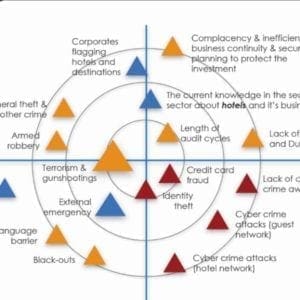 For many years, hotels and OTAs have had an ongoing feud, acting more like rivals than the business partners that they should be.
For many years, hotels and OTAs have had an ongoing feud, acting more like rivals than the business partners that they should be.
While many hotels appreciate the bookings that OTAs provide, all hoteliersÊhateÊthe exorbitant commission rates that top sites charge; to make matters worse, OTAs do not share customer information with hotels, which would be very helpful for hotels to improve the customer experience, because they want to Òown the customerÓ. That being said, the OTAs are still an indispensable tool for hotels because Ò52 per centÊof US travelers between the ages of 18 and 34 prefer booking hotels through online search engines as opposed to brand websites, compared with 37 per centÊaged 35 and olderÓ.Ê
Though it may go contrary to many hoteliers’ perceptions, the benefits of the OTA/hotel relationship do go both ways; in fact, the OTAs wouldn’t be nearly as profitable without this ongoing relationship, as hotels Òare the biggest source of growthÓ for the sites. The reason OTAs have been so successful is because they have an unfair advantage: unlimited spending power to boost customer acquisition. They use their high-tech systems to target and capture consumers, and then charge hotels dearly for the privilege of serving their own guests.Ê
As a founder of a hotel technology company that offers both a (new) hotel booking app/website that could be categorized as an OTAÊand a suite of private label mobile and booking services to hotels that help them battle OTAs,ÊI fully understand both sides of the argument. Because of this, I firmly believe the optimal success of both parties and the hospitality industry in general, will be based on hotels and OTAs learning to work more effectively as partners.
So, what would it take to create this utopic relationship between these two long-time adversaries?
Fortunately for hotels, this utopia is real and completely accessible. Since the early 2000s, Internet technology has provided OTAs with a big advantage over hotels, but changes in technology and consumer behavior are creating new ways for hotels and OTAs to work together. While the big boys of the OTA world, Booking.com,ÊHotels.com, Expedia, etc., may not be willing or able to get on board, there is a new breed of online booking channels emerging that exist to provide hotels with both the valuable service of increased bookings, and the technology to bring hotels and guests closer together. Even better, these channels aren’t looking charge hotels exorbitant commissions. In most cases, the business model behind these new channels is based on the idea of being partners that empower hotels to improve their bookings using unique strategies and tools, rather than the traditional disconnected OTA mindset.
What do these new breeds of online booking channels offer that traditional OTAs can’t?
They charge lower commission rates.
Enough said, right?!
They offer greater value to both hotels and bookers.
There are hundreds of online booking sites and apps that consumers can use when booking a hotel stay; there are the same number of options for hotels when choosing where to list their rooms. The new breed of booking channel offers true value to hotelsÊandÊconsumers, making them more attractive for both. Consumers get hotel rates and property features that build affinity to the brand, while hotels get access to technology and customer data that boost bookings and guest loyalty. The channel partner becomes the enabler of this win-win relationship and, of course, participates in the revenue stream and customer awareness.
Value-added hotel services offered by some of the new breed of online booking channels include:
áÊÊÊÊÊÊÊTools to identify high-value, socially active consumers. These types of customersÊareÊmore likely to review/recommend a property online, which can increase a property’s bookings and revenues over time, and more likely to share photos and videos via their social media accounts that will help influence their followers to consider making a similar trip purchase.
áÊÊÊÊÊÊÊAccess to customer history, profiles, and preferences so that hotels can tailor their offers and services to preferred guests.
áÊÊÊÊÊÊÊThe ability to send target messages and notifications with personalized offers that increase loyalty and bookings.
áÊÊÊÊÊÊÊCapabilities thatÊenable hotels to provide complete travel experiences, rather than just a place for guests to lay their heads at night. This is a key differentiator because Millennials, one of the fastest growing travel demographics, place moreÊimportance on experiences rather than material goods or luxury.
áÊÊÊÊÊÊÊHelping hotels to leverage the benefits of social influencer marketing, which involves inspiring consumers to indirectly sell your product via their social media posts or recommendations,Êwhich has been shown to have significant influence over Millennials’ booking decisions.
In addition to offering services that benefit the hotel, these new online booking channels offer value-added services to guests which will create more positive travel experiences, including:Ê
áÊÊÊÊÊÊÊMore in-depth understanding about the destination that they are traveling to. Millennial travelers want to know about and experience the local culture in every destination they visit. Providing this information in an informative, non-salesy manner can make all the difference between a potential guest booking with your property or the competition.
áÊÊÊÊÊÊÊAbility to create and shareÊuser-generated content (UGC)Êabout the property and the experience they had. This benefits socially active customers because they are being rewarded for doing something that they already love, being active on social media and sharing their travel experiences. It also increases loyalty to the new booking channels going forward, which results in more bookings for hotels.
áÊÊÊÊÊÊÊMobile tools that improve the hotel guest experience like mobile check-in and out, chat messaging with concierge and other on-property services.
Don’t encourage a race-to-the-bottom in pricing.
There is a mistaken idea in the minds of many consumers that they will find the best prices for hotels on the OTAs, rather than booking directly with the property; this is a because of the price-war awareness that OTAs have created with their huge marketing budgets and is also the primary reason that so many consumers still choose to book through OTAs. While it may have been true that cheaper rates were to be had via the OTAs in the past, today’s smart hoteliers have realized the benefits of more direct and partner-friendly sales channels where they can offer promotional rates and value-adds to incentivize consumers to book Ð while earning more revenue from each booking secured!
But until consumers realize that better deals are to be had via direct and partner-friendly channels, hotels should not emphasize discounting as OTAs do as a strategy to increase bookings. While it might provide a short-term benefit, it is not a smart revenue management strategy as it diminishes a property’s brand value in the minds of consumers. It’s also creates a downward spiral, as discounting strategies usually result in a race-to the-bottom that won’t stop until hotels are undercutting their bottom lines and eroding their financial performance.
By now, I’m sure that you can see that online booking channels and apps are not always the bad guys; there is a new breed of emerging online booking channels that want to partner with hotels and develop a mutually beneficial relationship, which in turn, will benefit potential guests and boost properties’ brand loyalty. So rather than listing all of your inventory on the big OTAs, try out the new channels; I can guarantee that you willÊnotÊbe disappointed!
By Mike Murray

Mike Murray is co-founder of TripCraft, a mobile technology company offering an innovative mCommerce platform for hospitality. At TripCraft, Mike oversees product development, technology, and business strategy while remaining a hands-on developer and architect of the company’s products. Mike has been developing innovative travel and technology solutions for over 25 years and his innovative thinking and systems can be seen powering some of the travel industry’s biggest names. Mike is founder of Vir.al, the new inspiration/hotel booking app/website. Vir.al is a new hotel booking app and website that capitalizes on today’s social media phenomenon to bring hotels and the valuable Millennial travel demographic together. Using curated, experience-based, destination-specific content, Vir.al enables users to create unique travel experiences, not just book a hotel room in which to sleep, and incentivizes them to increase their social media score in exchange for perks, promotions and status. Hoteliers can use the app’s back-end, which identifies socially active potential guests who are planning a trip to their destination, enables hoteliers to offer incentives to book and, as a result, boost their brand’s online visibility with and appeal to Millennials.















